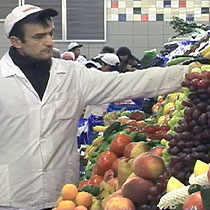-
(单词翻译:双击或拖选)
By Anya Ardayeva
Moscow
23 April 2007
A new law in Russia bans foreigners from working as clerks in retail1 stores and markets. Foreigners are able to work as loaders, cleaners, wholesalers or managers, but they are not allowed to sell directly to the public. Russian officials say the new legislation is aimed at combating a shadow economy, but human rights and migrant groups say the new law is unfair and unworkable. Anya Ardayeva reports from Moscow.
 |
| Russian immigration, fruit stand |
For the past ten years, Khalimjon Akhmadaliyev, from Tajikistan, has worked 12 hours a day selling vegetables at various Moscow markets.
"It's unfair because so many people worked so hard to come here and earn bread to feed their families and their children,” he says. “My children study here, I need to bring them up. I don't know what to do next. I guess I will have to pull my kids out of school and return home."
In January, Russia passed a new law banning foreigners from selling alcohol and medicine throughout the country. It also, as of April 1st, banned foreigners from selling at markets. The ban followed a number of troubling incidents – the largest, a riot in the northern Russian town of Kondopoga. Two local men died in a fight with ethnic2 Chechens.
Now, human rights activists3 say the bill might create more racial tension in Russia. For months, anti-racism campaigners have warned of growing racist4 sentiment in the country, especially after thousands of people in Moscow and other Russian cities last November participated in a so-called "Russian March," organized by the ultra-nationalist "Movement Against Illegal Immigration"
 |
| Nikita Mkrtchyan |
"This law has been passed because of some ideas that have something to do with pre-election period, to show that the power is meeting the demands of the people,” he says. “If the people do not like seeing foreign people at markets, if they don't want to see foreign faces at the markets, then the power does everything it can to get rid of those people."
Mkrtchyan also says this policy can have damaging consequences for the country's economy. While there are a million legal migrants working in Russia, Russian media reports suggest that the number of illegals is estimated at up to 12 million. Many come from much poorer countries, and often take jobs that Russian nationals do not want.
"Due to our economic growth, we will soon face a lack of labor6 resources everywhere. Of course we can't solve this without immigrants," says Mkrtchyan.
In October, Russian President Vladimir Putin said that the markets were often run by criminals with "ethnic flavor." He called on the government to take measures to "protect Russian producers and the local population."
Mktrchyan also is concerned that the new ban will boost corruption8 among bureaucrats9 and police as desperate foreigners offer bribes10 to dodge11 the new rules. Corruption is already rampant12 in Russia. Last year, the anti-corruption organization Transparency International ranked Russia as one of the most corrupt7 countries in the world.
 收听单词发音
收听单词发音
1
retail

|
|
| v./n.零售;adv.以零售价格 | |
参考例句: |
|
|
|
2
ethnic

|
|
| adj.人种的,种族的,异教徒的 | |
参考例句: |
|
|
|
3
activists

|
|
| n.(政治活动的)积极分子,活动家( activist的名词复数 ) | |
参考例句: |
|
|
|
4
racist

|
|
| n.种族主义者,种族主义分子 | |
参考例句: |
|
|
|
5
imposing

|
|
| adj.使人难忘的,壮丽的,堂皇的,雄伟的 | |
参考例句: |
|
|
|
6
labor

|
|
| n.劳动,努力,工作,劳工;分娩;vi.劳动,努力,苦干;vt.详细分析;麻烦 | |
参考例句: |
|
|
|
7
corrupt

|
|
| v.贿赂,收买;adj.腐败的,贪污的 | |
参考例句: |
|
|
|
8
corruption

|
|
| n.腐败,堕落,贪污 | |
参考例句: |
|
|
|
9
bureaucrats

|
|
| n.官僚( bureaucrat的名词复数 );官僚主义;官僚主义者;官僚语言 | |
参考例句: |
|
|
|
10
bribes

|
|
| n.贿赂( bribe的名词复数 );向(某人)行贿,贿赂v.贿赂( bribe的第三人称单数 );向(某人)行贿,贿赂 | |
参考例句: |
|
|
|
11
dodge

|
|
| v.闪开,躲开,避开;n.妙计,诡计 | |
参考例句: |
|
|
|
12
rampant

|
|
| adj.(植物)蔓生的;狂暴的,无约束的 | |
参考例句: |
|
|
|















